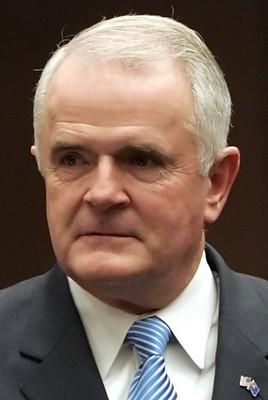Accuser recounts Gibbons-Trepp claims on TV

CARSON CITY — The former partner of Reno-based defense contractor Warren Trepp has repeated his claims that he saw Trepp give Nevada Gov. Jim Gibbons cash and casino chips worth “close to $100,000” while they were on a Caribbean cruise ship.
Dennis Montgomery repeated the allegation on an NBC News show that aired Friday. The report also included photos of Gibbons while on the weeklong cruise in March 2005, an excursion set up by Trepp, majority owner of eTreppid Technologies.
In one photo, Gibbons is seen hamming it up with others on the cruise. In another, he’s holding a glass of wine and wearing what appears to be a linen napkin fashioned as a pirate-style head scarf. In the same photo, Montgomery is seen wearing a similar head scarf and standing behind the governor pointing a finger at Gibbons’ wine glass. In a third shot, Gibbons is seen in a tuxedo, standing on a staircase with his wife and others.
Asked to comment on the NBC report, Gibbons’ press secretary, Melissa Subbotin referred to the governor’s previous denials of allegations against him made by Montgomery.
“We have already commented on these false accusations,” she said.
Gibbons attorney Abbe Lowell issued a statement to NBC saying the report included “old allegations by a disgruntled and apparently vindictive former business associate of Warren Trepp’s.”
Lowell also stated that Gibbons didn’t take cash or chips “or any improper gifts” from Trepp. Lawyers for Trepp have made similar denials.
Montgomery told NBC he was “absolutely, positively sure” that he saw Gibbons get the cash and chips from Trepp. He also said that during the cruise, “there was a lot of alcohol and a lot of drinking.”
Gibbons’ relationship with Trepp is the subject of a federal grand jury investigation. Montgomery has contended that Gibbons, while serving in Congress, accepted gifts from Trepp in return for assistance in securing federal contracts. Gibbons and Trepp have denied that occurred.
Montgomery and Trepp have sued each other in federal court, claiming ownership of software said to be worth millions.












